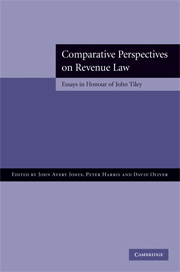Book contents
- Frontmatter
- Contents
- Contributors and affiliations
- Foreword by Dave Hartnett
- Foreword by Hugh Ault
- 1 A comparison of statutory general anti-avoidance rules and judicial general anti-avoidance doctrines as a means of controlling tax avoidance: Which is better? (What would John Tiley think?)
- 2 The judicial approach to avoidance: some reflections on BMBF and SPI
- 3 Comparing the application of judicial interpretative doctrines to revenue statutes on opposite sides of the pond
- 4 Abuse of rights and European tax law
- 5 The US legislative and regulatory approach to tax avoidance
- 6 The law of taxation and unjust enrichment
- 7 The history of royalties in tax treaties 1921–61: Why?
- 8 Land taxation, economy and society in Britain and its colonies
- 9 Meade and inheritance tax
- 10 Taxation, human rights and the family
- 11 Family connections and the corporate entity: income splitting through the family company
- Epilogue: Establishing the foundations of tax law in UK universities
- References
- Table of cases
- Table of abbreviations
- Index
10 - Taxation, human rights and the family
Published online by Cambridge University Press: 07 December 2009
- Frontmatter
- Contents
- Contributors and affiliations
- Foreword by Dave Hartnett
- Foreword by Hugh Ault
- 1 A comparison of statutory general anti-avoidance rules and judicial general anti-avoidance doctrines as a means of controlling tax avoidance: Which is better? (What would John Tiley think?)
- 2 The judicial approach to avoidance: some reflections on BMBF and SPI
- 3 Comparing the application of judicial interpretative doctrines to revenue statutes on opposite sides of the pond
- 4 Abuse of rights and European tax law
- 5 The US legislative and regulatory approach to tax avoidance
- 6 The law of taxation and unjust enrichment
- 7 The history of royalties in tax treaties 1921–61: Why?
- 8 Land taxation, economy and society in Britain and its colonies
- 9 Meade and inheritance tax
- 10 Taxation, human rights and the family
- 11 Family connections and the corporate entity: income splitting through the family company
- Epilogue: Establishing the foundations of tax law in UK universities
- References
- Table of cases
- Table of abbreviations
- Index
Summary
Introduction
Is it really worth having all this fuss and bother about the Human Rights Bill? Over the years the Convention has been interpreted to require United Kingdom courts to change their practices in various ways at the personal level, but what about protecting a person from an unjustified demand for tax?
In the realm of taxation, has the incorporation of the European Convention on Human Rights (hereafter ‘the Convention’) into United Kingdom domestic law by the Human Rights Act 1998 been all ‘fuss and bother’? Now that almost ten years have passed since the 1998 Act, what answer should one give to the question posed by Professor Tiley in 1998?
This short chapter cannot possibly seek to assess the impact of the European Convention on Human Rights on all aspects of the UK taxation system. Rather, this chapter seeks to examine only a narrow area: that is the impact of the Convention on the taxation of the family or, more correctly, how the Convention has been applied in tax cases involving personal and family status before the European Court of Human Rights. Taxation and the family is, of course, a particular area of interest of Tiley, and, as will be seen below, some of his comments on the discriminatory nature of UK tax provisions have proved to be quite prophetic.
- Type
- Chapter
- Information
- Comparative Perspectives on Revenue LawEssays in Honour of John Tiley, pp. 232 - 243Publisher: Cambridge University PressPrint publication year: 2008
- 1
- Cited by

